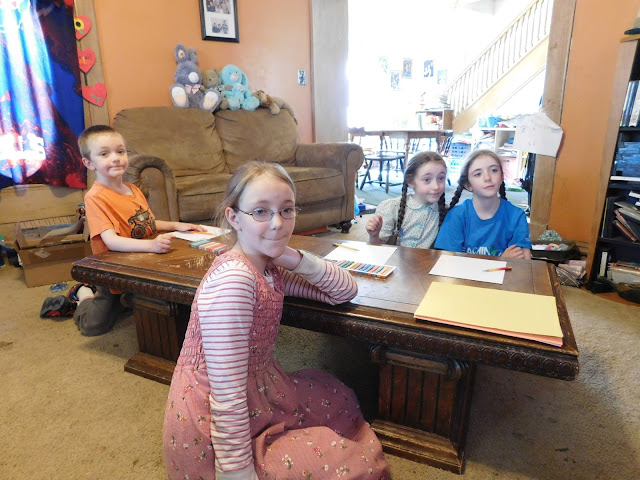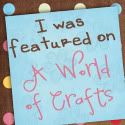The children and I have been having a blast learning new art techniques with ArtAchieve. Thanks to the Homeschool Review Crew, we had the opportunity to review the Entire Level II. We were so excited to have a chance to try out this level, because last year we reviewed Level I and enjoyed it immensely. I was very curious to see what differences there were in the next level. I was also looking forward to being able to include more art projects with our core curriculum. We have been "traveling" around the world, learning about different countries and cultures this year. Level II of ArtAchieve had quite a few projects that fit with the countries we were visiting, as you will see.
So, what exactly is ArtAchieve?
ArtAchieve is an online art program created by homeschool dad John Hofland. Mr. Hofland is also the instructor of the online video art lessons. The objects that the art lessons are based around have been found around the world. However, this program consists of more than just the art lessons themselves. Mr. Hofland has also included Cross Curricular Connections for each lesson. Perfect for us as homeschoolers. I personally love when we can connect the different subjects when we are learning.
With the package we received, we gained a full year's access to all 15 lessons in Level II. These lessons can also be purchased separately for five or six dollars a piece. Which is really cool if you don't think you would have a use for all of the lessons. However, if the bundle is purchased, there is a $17 discount. I love that we have a full year to use these lessons, and can do them as many times as we would like during that time frame.
Here is a list of the art projects available in Level II:
The Swedish Dala Horse
The Korean Wedding Duck
The Japanese Goldfish
The Elephant from Ghana
The Ukrainian Cat
The German Nutcracker
The Sri Lankan Landscape with an Elephant
Tessellations: Repeating a Pattern to Create Original Art
The Ukrainian Rooster
Hiding Butterflies
The Mexican Mask
The Russian Fortress - Color Value and Analogous Colors
The Polish Szopka
The Mermaid from Denmark
The Hawaiian Frog
The lessons themselves are online, and can be viewed in either the video or Power Point version. You do have to provide your own art supplies, but most of the time they are quite simple. The majority of the time we have used regular card stock or construction paper, a fine point permanent marker, acrylic paints (the kind that comes in the bottles, which we have plenty of), paintbrushes, and markers. There were some things we purchased special, such as glossy paper, chalk pastels, and watercolor paper. Printer paper and ink is also needed to print out the lesson warm up and print out.
Each lesson is comprised of informative information about the topic, a warm up, and the actual art lesson. Mr. Hofland gives a short lesson about the work of art which usually includes information about where it is from. He shows us what materials we will need to complete the lesson. This information is also found on the art lesson description page, which is available for viewing without paying for the lessons. When you go to the Bundled Lessons Entire Lesson II page, you will find all of the lessons pictured. If you click on the thumbnail image, it will take you to the page with the Art Lesson Description, the List of Supplies, the Cross- Curricular Connections, and how long it will take to complete the project.
He then leads the students through a relaxation exercise and moves into the warm up.
The warm up helps the student to become familiar with the kinds of lines that will be used in the art project. There are six boxes with lines that are portions of the finished project. Under each box is another box which is to be used to copy the designs in.
After we finish the warm up, we move right into the lesson. Mr. Hofland takes us step by step through the project.
Like Level I, there are some lessons where he uses "planning dots" and has us use our fingers to judge how much room certain aspects of the picture are going to take up. However, some of these Level II projects have been more advanced, where we have been looking at proportions. With the German Nutcracker above, we had to divide the paper into sections the height of the Nutcracker's head. And with the Swedish Dala Horse, we divided the paper into wedges to help figure out where each part was going to go.
Here is a closer look at how we drew our lines on the Nutcracker.
Mr. Hofland was able to eye these sections and figure out where to draw his lines, we ended up using a ruler.
Not only did we work with proportions, we also learned how to draw a landscape that showed depth, with the Sri Lankan Landscape with an Elephant. We learned to put the front objects on the paper first and make them bigger, than the things in the distance.
And with our latest project, the Japanese Goldfish, we learned about motifs while decorating our fish.
I will say, Level II is definitely a bit more complicated than Level I. Even Tabitha and Amelia, who are 10 and almost 9 respectively, struggled with keeping up with Mr. Hofland. I did a lot of pausing of the video for them to be able to keep up. Which, of course, is one of the reasons these video lessons are wonderful. You can pause and rewind the instructor until you feel comfortable with what you are doing.
I also found that the Power Point lessons were helpful if you tend to be slower. Unfortunately, I didn't think of using the Power Point until the Sri Lankan Landscape with an Elephant lesson. Though it is easier to go one slide at a time, moving ahead when ready, it was also not quite the same as having Mr. Hofland chatting with the student. You do miss out on some of what he says by using the Power Point. That and, at least with the Sri Lankan Landscape lesson, the steps aren't quite the same. He has two finished projects that are actually different in the way they are laid out. Not that that is a bad thing. I just thought it was important to note, so parents would be aware that there are possibly at least two ways to complete a project.
When we first received access to our Level II art lessons, we sat at the dining room table. Later, I discovered that it was easier to see what he was drawing in each step if we used the new computer with the bigger monitor. So, the children have been alternating between sitting at the dining table and the coffee table.
Usually Mr. Hofland uses a fine tip black marker, so it is easy to see what he is doing. I admit, it was harder to follow with the Sri Lankan Landscape project, as he was using pencil. However, we did get it figured out. And the children loved using the chalk pastels, especially when it came to blending the color with their fingers.
There was such a variety of materials used in these Level II projects. We've been enjoying them all.
There was such a variety of materials used in these Level II projects. We've been enjoying them all.
Here are the completed Swedish Dala Horses, which went well with our stay in Norway, another Scandinavian country.
We loved using the glossy paper with markers to make our Elephant from Ghana during our stay in Africa.
As you might be able to tell, the younger two had a bit of a harder time with their pictures. I let them complete them to the best of their ability, and didn't require them to follow the same instructions when it came to painting/coloring the projects.
We completed the German Nutcracker when we were learning about Germany, the Sri Lankan Landscape with an Elephant when we were in India, and just finished working on the Japanese Goldfish now that we are in Japan. I did not get separate pictures of each project, but we did hang all of our pictures up in our Art Gallery again.
We will be learning a bit about North Korea during our stay in Japan, so we will make the Korean Wedding Duck. Then we will be moving on to China. Though there isn't a project for China in Level II, there is in Level I. Then we will move on to Russia, which means we will get to make the Russian Fortress.
This is a wonderful art curriculum, especially if you are already learning about different countries in the world. It has been wonderful to be able to use the information in the Cross-Curricular Connections sections. I have found some wonderful books for a couple of the countries that were not listed in our core curriculum, such as How the Elephant Got Its Trunk by Rudyard Kipling and several books for Japan. Links are also provided to find out more information, such as facts about the country, or videos of dances that go with the lesson, or even science. If you aren't already learning about these countries, you can use the links and information to create your own study of countries and cultures.
I love the way Mr. Hofland teaches details about the art piece that the project is based on. We have even learned about a different kind of paper, called Ellie-Poo paper, which is made from elephant, well, um, poo. We admit, we had no desire to try the paper.
These lessons help us to be aware of the art we are creating. Not only do we watch Mr. Hofland draw, but we have our copy to follow along with, to figure out how the finished drawing is going to look. However, he reminds us that we are all individuals, and none of our projects are going to be exactly the same.
Once again, this is an art curriculum I love being able to talk about, and I highly recommend it.
You can actually try it out for yourself, with these free art lessons on the site.
You can actually try it out for yourself, with these free art lessons on the site.
Don't forget to check out what my fellow Crew Mates thought about ArtAchieve. Just click on the banner below:









































![[PREMIO2009.png]](https://blogger.googleusercontent.com/img/b/R29vZ2xl/AVvXsEjXD_Gx-wZ9EM5hXKrEYLksEBkYfRQtmb8VDVTDG_yyLggQoFIstZsh4zszdG20KqErZicRzEhiNYLty7j3IMXJYsABqkXjr8pp-ncj71xCbpxlXGbGpZq2fTuDQqq1RMKV4DPcDBnBViA/s1600/PREMIO2009.png)




No comments:
Post a Comment
Thank you for visiting my blog today. I love to read your comments, so please leave me one if you have the time.
Blessings